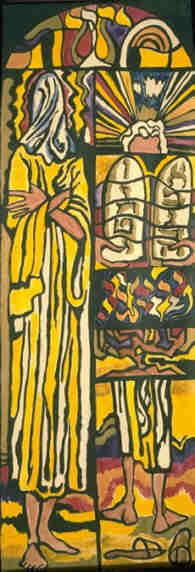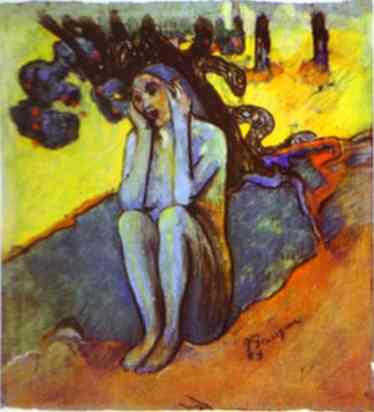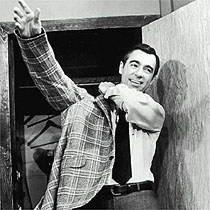
(Matthew 16:13-23)
May these words of this Peter be like a rock,
not a stumbling block!
|
|
"Who do you say
that I am?" Jesus asked. Simon Peter answered, "You
are the Messiah, the Son of the living God." And Jesus
answered, "Blessed are you, Simon son of Jonah! ... You are
Peter (petros), and on this rock (petra)
I will build my church..." Jesus then began to speak of
the rough road ahead. And Peter took him aside and rebuked him... "Get
behind me, Satan!" Jesus replied. "You are a stumbling
block..." (Matthew 16:13-23) May these words of this Peter be like a rock, |
"Lifting the Veil"
Message preached March 2, 2003
Long Green Valley Church of the Brethren
Glen Arm, Maryland USA
based upon 2
Corinthians 4:3-6
Fred
Rogers died
this week. Those who have raised children in the last three decades or more
probably know this man. Their preschoolers certainly did. Theyíve welcomed him
into their homes, for he lives in their "neighborhood." Forty  years
ago he started producing a television show for children, first in Canada, then
in the United States, where "Mr. Rogerís Neighborhood" is
still a staple of public television.
years
ago he started producing a television show for children, first in Canada, then
in the United States, where "Mr. Rogerís Neighborhood" is
still a staple of public television.
When he arrived at the pearly gates, you know what I imagine St. Peter said to Fred Rogers? "Itís a beautiful day in this neighborhood, a beautiful day for a neighbor. Would you be mine?..." Yes, Mr. Rogers was a Christian. Not only that, he was an ordained Presbyterian minister, whose parish was made up of millions of homes, and the little children in them to whom spoke to with respect.
His message was simple. For those in the initial stages of their development as persons, knowing that at least somebody likes you just the way you are, and considers you very special, is important. Starting out every show by changing out of his suit coat and loafers and into his sweater and sneakers, all the while looking directly into the camera, he came across as a friend who sincerely cares about you. And it wasnít a put-on. He was real, on and off camera.
Eventually, of course, children out-grow Mr. Rogers. They move on to other things, some of which are not very healthy for their growth. Itís funny to watch them complain about how "childish" Mr. Rogers is. Heís easy to make fun of. Iíve often wondered if the Simpsons character, Ned Flanders, wasnít modeled after Fred Rogers. You can make fun of him, but you also secretly appreciate him. Those raised with Fred in their TV long (deep down, perhaps) to return to the neighborhood where they were loved unconditionally.
Growing up
in this world, it seems like a veil is slowly pulled over our eyes. It prevents
us from seeing what is really real. Itís tough being a teenager, for instance,
for there is this veil over our eyes - how exactly it got there weíre never
really sure - which keeps us from seeing ourselves and others as we truly are.
Who ever determined that a certain size or shape or coloration (or whatever) of
the human body is what makes a person beautiful? And whoever decided that a
particular behavior is what defines "cool?" It is the plague of
adolescence to walk beneath a big question mark, per petually
wondering if youíre worth anything in this world. Too many change the question
mark to an exclamation point, as they toss their own insecurities on others,
inflicting pain upon those deemed ugly or uncool - whatever the current terms
might be.
petually
wondering if youíre worth anything in this world. Too many change the question
mark to an exclamation point, as they toss their own insecurities on others,
inflicting pain upon those deemed ugly or uncool - whatever the current terms
might be.
This
"veiled" condition is not unique to teenagers. Those of older years
struggle with their own version of this veiling, which prevents us from seeing
clearly - ourselves, others, God. Do all of us need a Fred Rogers to lift the
veil? "Itís you I like," he would sing to the children.
"Itís
not the things you wear,
itís not the way you do your hair -
but itís you I
like.
The way you are right now,
the way down deep inside you -
not the
things that hide you,
not your toys - theyíre just beside you.
But itís
you I like, every part of you -
your skin, your eyes, your feelings, whether old
or new.
I hope that youíll remember even when youíre feeling blue
that itís
you I like.
Itís you yourself, itís you.
Itís you ... I ... like!"
The story
is told in the Hebrew portion of our Bible of how Moses met God face to face on
the mountain. Godís message to the people through Moses, mind you, was not
"I like you just as you are." No, Moses returned to the children of
Israel with the Lordís commandments, full of "thou shalt"s and
"thou shalt not"s. While these were, if you will,
"conditions" for a relationship with God, what was
"conditional" was not the steadfast love of the  Lord.
This was a covenant, after all, not a contract. If these commandments were
broken, God would not tear up the agreement. No, as it says in Lamentations,
"the steadfast love of the LORD never ceases, his mercies never come to
an end" (3:22). In a way, it was "I love you
just as you are."
Lord.
This was a covenant, after all, not a contract. If these commandments were
broken, God would not tear up the agreement. No, as it says in Lamentations,
"the steadfast love of the LORD never ceases, his mercies never come to
an end" (3:22). In a way, it was "I love you
just as you are."
When Moses returned to the people from the mountain, scripture says that his face shone because he had been with God, and this really frightened those folks. Thereafter, Moses took to wearing a veil when he came back to the people after being with God. He didnít want to scare them back to Egypt (Exodus 34:29-35).
Perhaps it was like when Adam and Eve became afraid in the garden of Eden. They had broken the first commandment God had ever given and ate from the tree of the knowledge of good and evil. It was then like a veil was pulled over their faces. Each took one look at themselves and then the other and what did they do? Grabbed a fig leaf and covered up. Then they hid from God (Genesis 3:1-10). Of what or of whom were they most afraid? Their own nakedness? Their new "knowledge" of each other? Were they now afraid of God? If you will, that was the first "veiling" experience in the Bible, for that fig leaf covered their eyes as well.
The New Testament is a story of unveiling. It tells of how God in Christ took off the veil and stood with the children of Israel, really with all the children of this earth, young and old. As the apostle Paul wrote to the folks in Corinth, Jesus is the very image of God. Godís glory, the light of the Lord not only shone once upon a time, but continues to shine through him. The veil, whether it be the covering over Godís face or ours, or the sheet that once prevented the people from looking into the holy of holies in the Temple, has been removed, torn asunder. "And all of us, with unveiled faces, seeing the glory of the Lord as though reflected in a mirror," Paul wrote, "are being transformed into the same image from one degree of glory to another" (2 Corinthians 3:18).Or, to paraphrase, There is now "nothing between us and God, our faces shining with the brightness of his face. And so we are transfigured" (remember the scripture story we heard earlier from Mark 9:2-9) "much like the Messiah, our lives gradually becoming brighter and more beautiful as God enters our lives and we become like him" (from The Message, by Eugene Peterson).
Of course,
not everybody sees it that way. Itís like a veil is still over the eyes of
folks. Paul attributes this veiling to "the god (little
"g") of the present age." Itís not the Lord God who
messes with peopleís vision, mind you. Itís not the God  of
Adam and Eve who declares only certain body shapes, sizes, colors, etc. as
beautiful. The word once spoken on this remains the bottom line: "God
saw everything that he had made, and indeed, it was very good" (Genesis
1:31a). The Lord did have something to say about behavior, but it wasnít
a matter of keeping up with the folks next door, or trying to be
"cool," or whatever the current words are. God does not define whatís
"in" or "out" at the present moment. Thatís more in the
job description of the one who pulls the wool over peoplesí eyes.
of
Adam and Eve who declares only certain body shapes, sizes, colors, etc. as
beautiful. The word once spoken on this remains the bottom line: "God
saw everything that he had made, and indeed, it was very good" (Genesis
1:31a). The Lord did have something to say about behavior, but it wasnít
a matter of keeping up with the folks next door, or trying to be
"cool," or whatever the current words are. God does not define whatís
"in" or "out" at the present moment. Thatís more in the
job description of the one who pulls the wool over peoplesí eyes.
While the Bible does say that "the fear (read in awe or wonder) of the Lord is the beginning of wisdom," God doesnít want us to live out of fear. In an insecure world - which desires that we always be afraid - itís all too easy to lead insecure lives. Advertising, for instance, is built upon our insecurity. Otherwise, we wouldnít go out and buy the newest thing. Talk about wool over your eyes, a veil over your face - the models in most clothing catalogs are rarely your average Jane or Joe. The lifestyle uplifted is hardly that of your everyday family. Sometimes itís downright offensive. And we wonder why Muslims in the East try to veil their eyes from what they see in the West. Of course, "the god (little "g") of the present age" is doing a number on them, also. The real "great Satan" is a worldwide, equal opportunity veiler.
This
"god (little "g") of the present age,"
however, is not all that great. Jesus, through whom the light of God shines out
even in the darkness, unveiled the coming Kingdom of God. Godís
"neighborhood," if you will, is very near, a message he proclaimed in
word and deed. Nothing in all creation (even "the god (little
"g") of the present age") can stop it. As Paul wrote in an other
letter, nothing "can separate us from the love of God in Jesus Christ"
(Romans
8:38-39). Thy kingdom come, thy will be done, on earth as it is in
heaven. "Itís a beautiful day in the neighborhood, a beautiful day for a
neighbor. Would you be mine?"
other
letter, nothing "can separate us from the love of God in Jesus Christ"
(Romans
8:38-39). Thy kingdom come, thy will be done, on earth as it is in
heaven. "Itís a beautiful day in the neighborhood, a beautiful day for a
neighbor. Would you be mine?"
Laugh, if you must, at the simplicity of the message which Mr. Rogers "preached" in little, loving ways to children. Yes, his sweater and sneakers remained the same through three decades of fashion changes. [Actually the zip-up sweaters he wore were all knitted by his mother.] In the process they became national icons, spoofed by comedian Eddie Murphy and treasured by the Smithsonian. If laughing helps remove the veil to reveal the light that shone through this Christian, then giggle away.
He, and Paul, and you and me, were and are called to reveal, to proclaim a simple message, about Christ and the Kingdom of God. Weíre called to let Godís light shine in our lives. We donít do so, however, to blind people. Unfortunately, thatís how some folks do it, almost intentionally shutting the eyes and ears of others with their brilliance - their great intellect or their great faith. As Paul put it, though, "we do not proclaim ourselves; we proclaim Jesus Christ as Lord and ourselves as your slaves for Jesusí sake."
Itís
called preaching the coming "neighborhood" of God by reaching out,
like the good Samaritan, an d
being a neighbor (see Luke
10:25-37). Itís called letting your light shine such that you are
like a lamp in a house by which people can see their way more clearly, i.e. not
blinded by your brilliance, but touched by the things you say and do which give
glory to God and not to you (see Matthew
5:14-16). In this way, the veil is lifted, and we all see God in
Christ Jesus more clearly.
d
being a neighbor (see Luke
10:25-37). Itís called letting your light shine such that you are
like a lamp in a house by which people can see their way more clearly, i.e. not
blinded by your brilliance, but touched by the things you say and do which give
glory to God and not to you (see Matthew
5:14-16). In this way, the veil is lifted, and we all see God in
Christ Jesus more clearly.
Well, to borrow from Mr. Rogerís format, itís time to exchange our sweater and sneakers for our everyday clothes, and head out to do the work of the church in our everyday lives. We could close by singing the song with which he ended every program with the children. Instead, letís sing a hymn that - by its end - reveals that God is not invisible, nor hidden. Whenever Jesus shines through us, the veil is lifted, and God is revealed.
| see: "Won't
You Be My Neighbor?," by Wendy Murray Zoba, Christianity Today, March 6, 2000. "Mister Rogers takes off the cardigan," by Robert Bianco, USA TODAY, 08/27/2001. "It's a Beautiful Day in the Neighborhood: Mister Rogers' Positive Influence on Children," by Kristi Miller, Goshen College |
|
| online resources for this scripture text |
For commentaries consulted, see 2 Corinthians. |
©2003 Peter L. Haynes